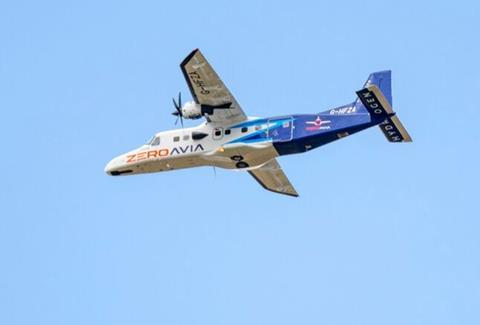Airbus is to collaborate with hydrogen-electric propulsion specialist ZeroAvia on approaches to certification for power systems which use hydrogen, and co-operate in such technical areas as fuelling operations and fuel-cell testing.
ZeroAvia has disclosed the collaboration as Airbus – along with several other entities – participate in a new financing round for the company, which is developing hydrogen fuel-cell powertrains.
“For ZeroAvia to now have investors such as Airbus coming on board is the strongest possible validation of the prospects for hydrogen-electric propulsion technology,” says chief executive Val Miftakhov.
The company states that the investment and co-operation will enable it to “accelerate progress” towards certifying its initial engine, the ZA600, which is intended for service entry in 2025. The powerplant is designed for aircraft up to 20 seats and is being tested on a Dornier 228.

ZeroAvia is also developing a larger engine, the ZA2000, aiming to test it on a De Havilland Dash 8-400 supplied by Alaska Airlines – one of the companies taking part in the funding round.
Airbus is pursuing its own hydrogen-powered aircraft programme, ZEROe, with a view to service entry by 2035.
ZEROe vice-president Glenn Llewellyn says ZeroAvia’s technology is “in a strong position” for further development, adding that its support for a wider hydrogen ecosystem – including certification and fuel supply – complements Airbus’s own ambitions.
Airbus is co-leading the latest financing with Saudi Arabia’s Neom Investment Fund, which is linked to the kingdom’s ambitious future sustainable city project, as well as Barclays Sustainable Impact Capital.
Alaska Airlines is participating alongside such entities as Horizons Ventures, Breakthrough Energy Ventures, and Ecosystem Integrity Fund.


























